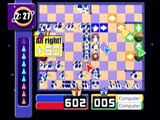 Sega has a serious hit on their hands. Not only was ChuChu Rocket
advertised on Japanese TV with the coolest video game
commerical ever, but it was also an instant hit. The first online multiplayable game
available in the US for the Dreamcast, ChuChu Rocket exemplifies the high quality, solid
gaming we've come to expect from Sonic Team. It looks like America is ChuChu crazy as
well, at least a glance at the user lists on Sega's multiplayer servers tells you there
are a lot of people who have caught the bug – or the mouse, and if you haven't played
this game yet you're missing out on an incredibly good time.
Sega has a serious hit on their hands. Not only was ChuChu Rocket
advertised on Japanese TV with the coolest video game
commerical ever, but it was also an instant hit. The first online multiplayable game
available in the US for the Dreamcast, ChuChu Rocket exemplifies the high quality, solid
gaming we've come to expect from Sonic Team. It looks like America is ChuChu crazy as
well, at least a glance at the user lists on Sega's multiplayer servers tells you there
are a lot of people who have caught the bug – or the mouse, and if you haven't played
this game yet you're missing out on an incredibly good time.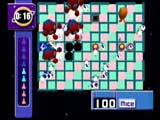 ChuChu Rocket is a puzzle game,
and it ranks right up there with Tetris and the many Othello clones that have graced
electronic devices from the NES to watches to arcade machines to PCs. We can't get enough
of these ultra simple puzzlers. They're the kind of games that make you see them in your
sleep. Played alone, or with as many people as possible, they always offer great gaming
that is equal parts twitch and cerebral play. There's no way to do well without having a
certain strategy developed, but the random nature of the games, as well as the feverish
pace of progress, keeps your animal reflexes sharp. They don't usually get a whole lot of
press, but puzzlers like these do usually outlive the systems they were designed for, and
find themselves carried over in a multitude of clones and ripoffs.
ChuChu Rocket is a puzzle game,
and it ranks right up there with Tetris and the many Othello clones that have graced
electronic devices from the NES to watches to arcade machines to PCs. We can't get enough
of these ultra simple puzzlers. They're the kind of games that make you see them in your
sleep. Played alone, or with as many people as possible, they always offer great gaming
that is equal parts twitch and cerebral play. There's no way to do well without having a
certain strategy developed, but the random nature of the games, as well as the feverish
pace of progress, keeps your animal reflexes sharp. They don't usually get a whole lot of
press, but puzzlers like these do usually outlive the systems they were designed for, and
find themselves carried over in a multitude of clones and ripoffs.
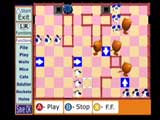 ChuChu
Rocket fits nicely into the genre. The main game is pretty simple: You play one of four
rockets located on a board. The board is divided into a grid, and, depending which board
you're playing on, has walls placed in different locations to make things interesting.
There are four generators on the grid that produce ChuChus and KupoKupos. The ChuChus are
"space mice" and the KupoKupos are "space cats." As you might guess,
the KupoKupos are out to get the ChuChus, and it's your job to usher the ChuChus into your
rocket while trying to send the KupoKupos toward your opponents. Neither ChuChus nor
KupoKupos are very bright. They follow each other in a line until they hit a wall, and
then they turn right. You can further alter their path by laying arrow panels that direct
them to turn when there isn't a wall. By laying your panels right you can get a whole
stream of ChuChus entering your rocket, and you can also usurp the streams of other
players.
ChuChu
Rocket fits nicely into the genre. The main game is pretty simple: You play one of four
rockets located on a board. The board is divided into a grid, and, depending which board
you're playing on, has walls placed in different locations to make things interesting.
There are four generators on the grid that produce ChuChus and KupoKupos. The ChuChus are
"space mice" and the KupoKupos are "space cats." As you might guess,
the KupoKupos are out to get the ChuChus, and it's your job to usher the ChuChus into your
rocket while trying to send the KupoKupos toward your opponents. Neither ChuChus nor
KupoKupos are very bright. They follow each other in a line until they hit a wall, and
then they turn right. You can further alter their path by laying arrow panels that direct
them to turn when there isn't a wall. By laying your panels right you can get a whole
stream of ChuChus entering your rocket, and you can also usurp the streams of other
players.
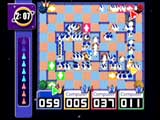 KupoKupos
eat ChuChus if they catch them. ChuChus can easily outrun them, but that means the little
mice will often end up running into a space cat from behind. KupoKupos can also destroy
your arrow panels if they run headlong into them twice. These special rules make KupoKupos
a little less predictable. Arrow panels also disappear over time, making it even more
difficult to maintain a steady stream of ChuChus into your rocketship. To make things even
more complicated, you occasionally direct mystery ChuChus into your rocket which make
various things happen in the game. For example, you might get a Mouse Monopoly, where all
the ChuChu stream to your rocket, or you may end up switching places, creating Cat Mania,
or causing global Cat Attacks.
KupoKupos
eat ChuChus if they catch them. ChuChus can easily outrun them, but that means the little
mice will often end up running into a space cat from behind. KupoKupos can also destroy
your arrow panels if they run headlong into them twice. These special rules make KupoKupos
a little less predictable. Arrow panels also disappear over time, making it even more
difficult to maintain a steady stream of ChuChus into your rocketship. To make things even
more complicated, you occasionally direct mystery ChuChus into your rocket which make
various things happen in the game. For example, you might get a Mouse Monopoly, where all
the ChuChu stream to your rocket, or you may end up switching places, creating Cat Mania,
or causing global Cat Attacks.
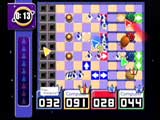 That's
the basic game, which accomodates one to four players. You can play with up to four people
locally or online. Online play is well-designed. If you've got your Dreamcast configured
to dial up to your ISP, all you have to do is pop in the ChuChu Rocket disk to begin
online play. After dialing up and entering your username, you are presented with a list of
servers. Once on a server there is a room for help and information, and a whole lot of
gamers hanging out waiting to play. It works very much like online play on a PC. Create a
game room, hang out until four people enter, possibly chatting with other gamers, and then
begin the carnage. Online you play a best of three tournament, which makes the game last a
good ten to twenty minutes. Slowdown is minimal, and when it does occur it is comforting
to know that everyone is experiencing the same lag. Over a week of intensive game testing,
we've only experienced bothersome lag a couple of times, which is not a bad record. It
looks like Sega got the infrastructure put together pretty well. One of the most
impressive aspects of the online play is that you can go online with up to three people
playing on your local DC. It's great to get on with two people locally and play against
another two people from who-knows-where.
That's
the basic game, which accomodates one to four players. You can play with up to four people
locally or online. Online play is well-designed. If you've got your Dreamcast configured
to dial up to your ISP, all you have to do is pop in the ChuChu Rocket disk to begin
online play. After dialing up and entering your username, you are presented with a list of
servers. Once on a server there is a room for help and information, and a whole lot of
gamers hanging out waiting to play. It works very much like online play on a PC. Create a
game room, hang out until four people enter, possibly chatting with other gamers, and then
begin the carnage. Online you play a best of three tournament, which makes the game last a
good ten to twenty minutes. Slowdown is minimal, and when it does occur it is comforting
to know that everyone is experiencing the same lag. Over a week of intensive game testing,
we've only experienced bothersome lag a couple of times, which is not a bad record. It
looks like Sega got the infrastructure put together pretty well. One of the most
impressive aspects of the online play is that you can go online with up to three people
playing on your local DC. It's great to get on with two people locally and play against
another two people from who-knows-where.
If that were the whole game, it would still be a blast. But the console market probably
isn't quite ready for a title that relies mainly on online play. So ChuChu Rocket
incorporates more game modes that make it truly amazing. In the Puzzle mode you are
confronted with a customized board. You have a limited number of arrow panels to place,
and sometimes there are KupoKupo. The goal in Puzzle mode is to get all the ChuChus into
the rocket with the limited arrows you have. You place your arrows, hit "Go,"
and see what happens. These are great little distractions, especially when playing alone,
and just about as much fun as the multiplayer game. ChuChu Rocket comes with 75 puzzles,
and you can also create your own and trade them online. The possibilities are endless.
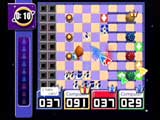 There is another two player game called Stage Challenge. Here, you are given a
board and a task, as in the Puzzle mode, but you must place your arrows in real time, and
often you must work closely with your teammate to get all the ChuChus into the rocket. The
Stage Challenge is like the Puzzle mode, but with all the twitch put back into it, and it
really increases dexterity for playing the main game. When tempers flare, and you just
have to get it all back together, the Stage Challenge is the perfect relief. Again, it's
almost as much fun as the multiplayer game.
There is another two player game called Stage Challenge. Here, you are given a
board and a task, as in the Puzzle mode, but you must place your arrows in real time, and
often you must work closely with your teammate to get all the ChuChus into the rocket. The
Stage Challenge is like the Puzzle mode, but with all the twitch put back into it, and it
really increases dexterity for playing the main game. When tempers flare, and you just
have to get it all back together, the Stage Challenge is the perfect relief. Again, it's
almost as much fun as the multiplayer game.
The graphics and sound on ChuChu Rocket are great, but they won't set any new
standards. And why should they? They're incredibly easy to see and very clear, which is of
the utmost importance for such a hectic game. Most of the time you view the board from
above, so everything looks pretty flat, but the characters are rendered in three
dimensions. The menus and functions are very streamlined, and the instruction manual is
really not necessary to get going on the game, which is a good sign. You move your pointer
around, and you place arrows by hitting the A, B, X, or Y buttons, which correspond to the
four directions.
The only real downside to ChuChu Rocket, aside from the mania caused by a week straight
of nothing but ChuChu dreams, is that you can't taunt online. In the local multiplayer you
can shout random taunts (nothing too outrageous) by pulling the triggers, but during
online play you can't do that. You also can't chat during games, but that makes complete
sense. It's hard enough just keeping up.
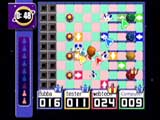 So ChuChu Rocket is an amazing game for all ages. It's one of those games you
can play with Mom and Dad and Junior. And if Mom and Dad and Junior all live in different
states, well, you can work with that, too. If you ever loved Tetris, or if you've been
enthralled with Othello or its imitators, you will undoubtedly love ChuChu Rocket. It is a
monumental occasion – Sega produces the first console game with online playability.
Too often technical landmarks like this are made by mediocre games. Sega has pulled it off
with the utmost skill, charm, and gaming excellence.
So ChuChu Rocket is an amazing game for all ages. It's one of those games you
can play with Mom and Dad and Junior. And if Mom and Dad and Junior all live in different
states, well, you can work with that, too. If you ever loved Tetris, or if you've been
enthralled with Othello or its imitators, you will undoubtedly love ChuChu Rocket. It is a
monumental occasion – Sega produces the first console game with online playability.
Too often technical landmarks like this are made by mediocre games. Sega has pulled it off
with the utmost skill, charm, and gaming excellence.

 Sega has a serious hit on their hands. Not only was ChuChu Rocket
advertised on Japanese TV with the coolest video game
commerical ever, but it was also an instant hit. The first online multiplayable game
available in the US for the Dreamcast, ChuChu Rocket exemplifies the high quality, solid
gaming we've come to expect from Sonic Team. It looks like America is ChuChu crazy as
well, at least a glance at the user lists on Sega's multiplayer servers tells you there
are a lot of people who have caught the bug – or the mouse, and if you haven't played
this game yet you're missing out on an incredibly good time.
Sega has a serious hit on their hands. Not only was ChuChu Rocket
advertised on Japanese TV with the coolest video game
commerical ever, but it was also an instant hit. The first online multiplayable game
available in the US for the Dreamcast, ChuChu Rocket exemplifies the high quality, solid
gaming we've come to expect from Sonic Team. It looks like America is ChuChu crazy as
well, at least a glance at the user lists on Sega's multiplayer servers tells you there
are a lot of people who have caught the bug – or the mouse, and if you haven't played
this game yet you're missing out on an incredibly good time.